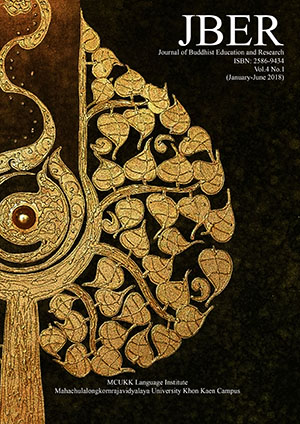The Factors of the Wise Man in the concepts of Theravāda Buddhism
Keywords:
The factors of the Wise Man: Su, Ci, Pu and LiAbstract
The objective of this text is to study of “The factors of wise man in Theravāda Buddhism”. This is aimed (1) To study the factor of wise man in the concepts of Theravāda Buddhism, (2) To analyze the concept of factors of wise man in Theravāda Buddhism.
In this text, the four factors: Su, Ci, Pu and Li are basic root to develop the man to become the wise man in the perspectives of worldly knowledge. Su is abbreviated from sutta means listening or learning which make the learned man. Ci is abbreviated from cinta means thinking which makes the thoughtful man. Pu is abbreviated from pucha means asking or inquiring which makes considered man. And Li is abbreviated from likhita means taking note which makes memorable man. Thus su, ci, pu and li (listening, thinking, asking and taking note) are basis root of wise man.
The factors of wise man are to create the knowledge of the man is considered as scholar or wise man who is full of the worldly knowledge for solving the problems of life and living happily. So the factors of wise man is creating of wisdom for man to solve the problems of life and finding the real happiness.
References
Buddhist Institute. (1967) Pāli Tipitaka and its Translation. (Phnom
Penh:Phnom Penh Buddhist Institute Press.
K Sri Dhammananda. (1973). What the Buddhist Believe. Kuala Lumpur:
Malaysia.
Mahathera Sayadaw, Ledi. (2004). The Manuals of Buddhism. Yangon:
Mother Ayeyara Waddy Publishing House of Myamar, 2004.
Paññā,http://self.gutenberg.org/articles/eng/Pa%C3%B1%C3%B1%C4%81?V
iew= embedded retrieved on May 15, 2018.
Pesala, Bhikkhu. (2013). An Exposition of The Maṅgala Sutta. Latest : Edition
July 2013)
Phra Brahmagunabhorn P. A. Payutto. Dictionary of Buddhism. Thirty-fourth
publishing, Amphoe Pak Kret, Chang Wat Nonthaburi 11120, 2011.
Phramahachumporn wannaphap. (2015) . Roles of Monks With Ecclesiastical
Rankings (Sanghathikarn) In Encouraging A Quality of Life of The
People in Roi-Et Provine . Journal of Graduate MCUKK honkaen
campus, 2 (1), 39-49.
Russell, Bertrand. (1976). The Problems of Philosophy. Oxford University
Press, Oxford New York, 1976.
Students Note-Taking as a Knowledge-Construction Tool‖
https://link.springer.com/ article /10.1007/s10674-005-8557-4
retrieved on January 5, 2018
Taipei, Taiwan, R.O.C. 2005.
The Veneratble Ledi Sayadaw, The Requisites of Enlightenment.
(Bodhipakkhiya
Visuddhimagga,http://self.gutenberg.org/articles/Visuddhimagga?View=embe
dded retrieved on December 27, 2017.
Walpola Rahula. What the Buddha Taught.11F., 55 Hang Chow South Road
Sec 1,
Wehmeier, Sally. (2001). Oxford Advanced Learner‟s Dictionary. Oxford
New York:Oxford University Press.





